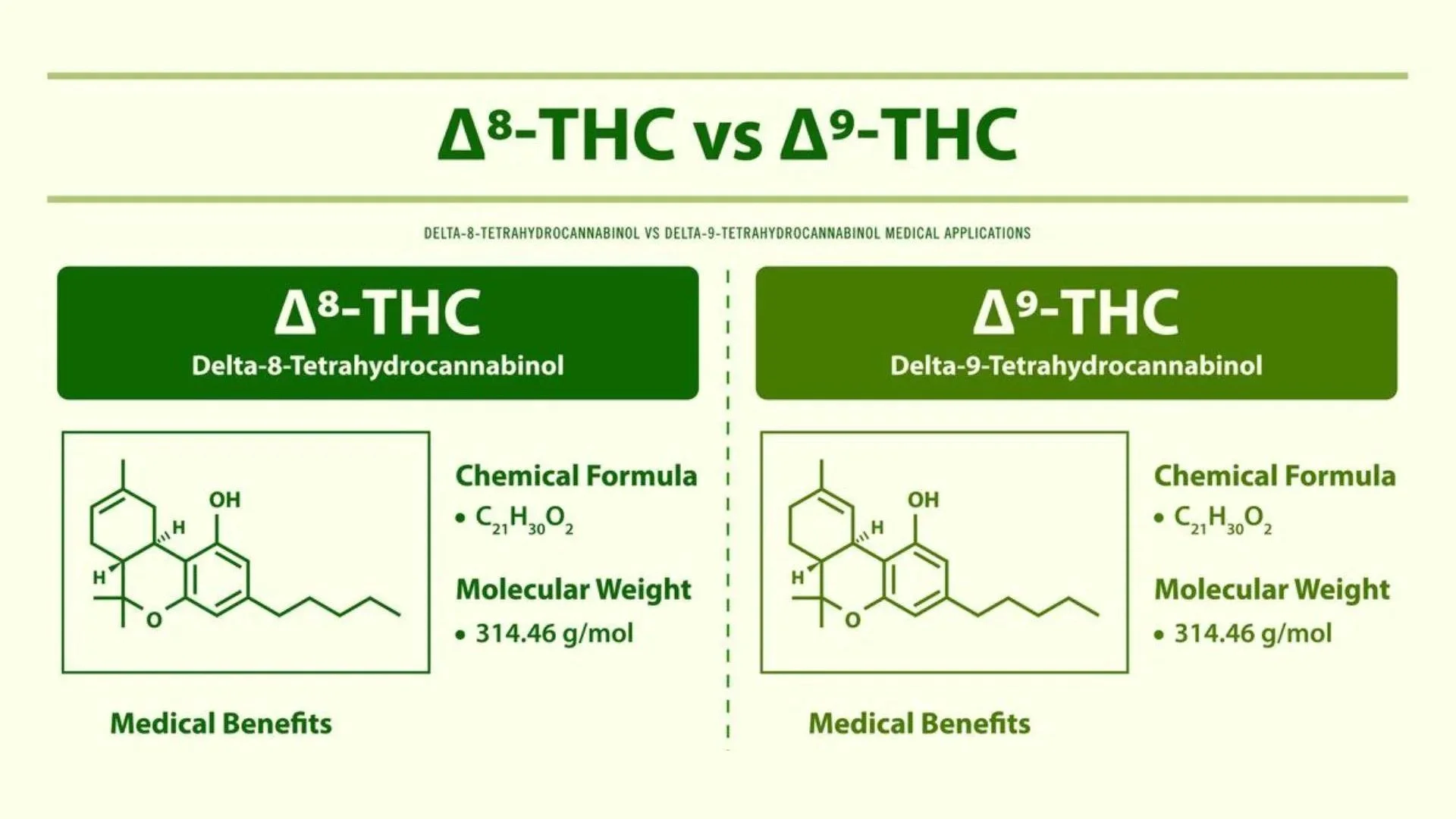

THC, or tetrahydrocannabinol, is the main psychoactive compound in cannabis that produces the high sensation. However, not all THC molecules are the same. There are different forms of THC, such as delta 8, delta 9, and delta 10, that have slightly different chemical structures and effects on the body and mind. In this post, we will focus on the two most common and popular forms of THC: delta 8 and delta 9.
Must Read: What is the difference between THC and CBD
Delta 8 THC is a minor cannabinoid that occurs naturally in cannabis plants in very small amounts. It is similar to delta 9 THC, but it has a double bond on the eighth carbon atom instead of the ninth. This subtle difference makes delta 8 less potent and more stable than delta 9.
Because delta 8 is scarce in cannabis plants, most delta 8 products are made by synthetically converting CBD or delta 9 THC into delta 8. This process can involve the use of chemicals and solvents that may not be safe for human consumption. Some of these chemicals include hydrochloric acid, sodium hydroxide, toluene, heptane, and hexane.
Delta 9 THC is the most abundant and well-known form of THC in cannabis plants. It has a double bond on the ninth carbon atom, which makes it more reactive and unstable than delta 8. Delta 9 is responsible for most of the psychoactive effects of cannabis, such as euphoria, relaxation, altered perception, and increased appetite.
Delta 9 THC products are widely available in states where recreational or medical marijuana use is legal. They come in various forms, such as flowers, edibles, oils, concentrates, and vapes. The potency of delta 9 products can vary depending on the strain, method of consumption, and individual tolerance.
Both delta 8 and delta 9 interact with the endocannabinoid system (ECS), a network of receptors and molecules that regulate various functions in the body, such as mood, pain, inflammation, memory, and sleep. Delta 8 and delta 9 bind to CB1 receptors, which are mainly found in the brain and nervous system.
However, delta 8 has a lower affinity for CB1 receptors than delta 9, which means it activates them less strongly. This results in a milder and smoother high than delta 9. Some users report that delta 8 produces less anxiety, paranoia, and confusion than delta 9. Delta 8 may also have more medicinal benefits than delta 9, such as anti-nausea, anti-inflammatory, and neuroprotective effects.
The legal status of delta 8 and delta 9 varies depending on the state and federal laws. In general, delta 9 is illegal under federal law (the Controlled Substances Act), but it is legal for recreational or medical use in some states (such as California, Colorado, Oregon, etc.). Delta 8 is technically legal under federal law if it is derived from hemp (a type of cannabis plant that contains less than 0.3% delta 9 THC), but it is illegal or restricted in some states (such as Alaska, Arizona, Arkansas, etc.).
Therefore, before buying or using any delta 8 or delta 9 products, you should check the local laws and regulations in your area. You should also be careful about the quality and safety of the products you buy, as they may not be tested or regulated by any authority.
FDA expressed concern about the potential risks associated with delta-8 CBD, particularly in terms of the lack of research on its effects and the potential for unapproved drugs to be marketed to consumers. The agency noted that it has received reports of adverse events related to delta-8 THC, including hospitalizations and emergency department visits.
D8 and d9 are different forms of THC that have similar but distinct effects on the body and mind. Delta 8 is less potent and more stable than delta 9, which may make it more appealing for some users who want a milder high or more medical benefits. However, both substances are subject to legal uncertainties and potential health risks. Some experts warn that Delta-8 can be more dangerous than Delta-9 THC due to its lack of standardization, consistency, and oversight. It is important to be aware of its potential implications for delta drug testing and take appropriate precautions to avoid any unwanted consequences.
Contact goMDnow today to learn about our affordable and flexible testing options. Either its delta 8 and delta 9 or screening for other illicit drugs, we got you covered.